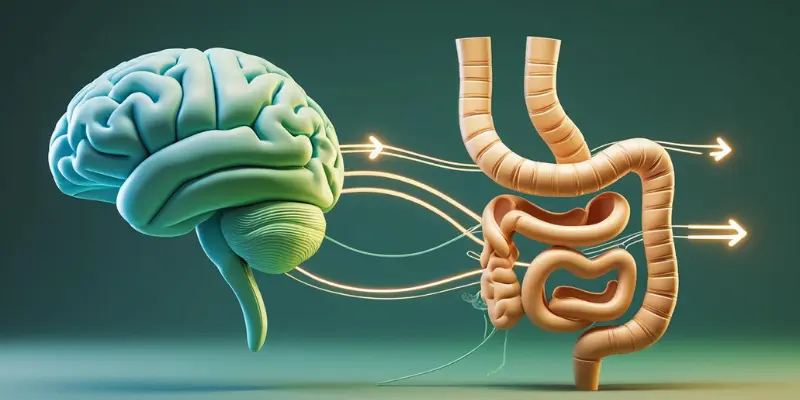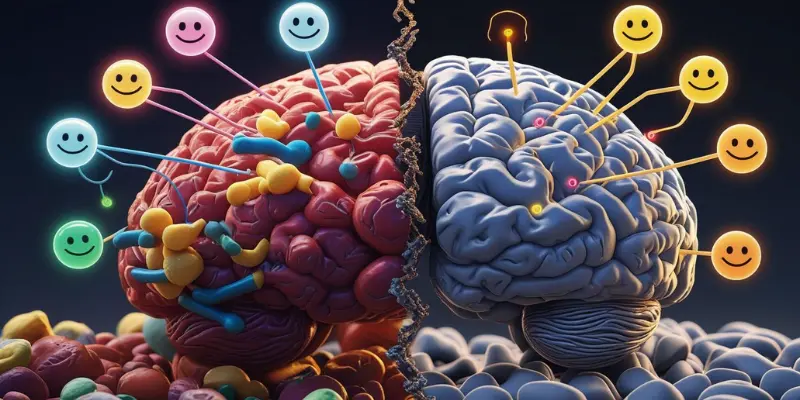Unlock Your Mood & Focus: The Mind-Gut Connection for Lasting Personal Well-Being
Published: 13/07/2025
Ever feel stuck in a mental fog, battling low energy, or experiencing unexplained mood swings despite trying everything? What if the secret to a brighter mood and sharper focus wasn’t in your head, but in your gut?
You’re not alone in feeling this way. Many of us experience the frustration of trying to stay productive, positive, and energized while constantly struggling with brain fog, emotional rollercoasters, or a lack of focus. No matter how much sleep you get or how many productivity hacks you try, the fog never seems to lift. It’s exhausting—and it can leave you wondering: What’s missing?
The answer might lie in a surprising place: your gut.
The Mind-Gut Connection is an often-overlooked yet incredibly powerful pathway that plays a critical role in how we feel, think, and function every day. In this article, we’re going beyond the basics to dive into the latest research on the gut-brain axis—the science that links your gut health directly to your mood, focus, and overall well-being.
By the end of this post, you’ll not only understand the science behind this connection but also walk away with actionable strategies—from food choices to lifestyle habits—that you can implement today for lasting improvements in your mood, energy, and mental clarity.
The Bidirectional Highway: Understanding Your Mind-Gut Connection
To truly unlock the potential of your mind and focus, understanding the deep and intricate relationship between your brain and gut is essential. This connection is far more complex than simply digesting food—it’s a bidirectional highway, where signals travel back and forth between your gut and brain, constantly influencing one another. Let’s break it down.

More Than Just Digestion: Your Second Brain
When we talk about the gut as your “second brain,” we’re not just using metaphorical language. The Enteric Nervous System (ENS), which exists within the lining of your gastrointestinal tract, is a massive network of neurons, and it functions almost independently from the brain. In fact, it contains around 100 million neurons—more than your spinal cord!
This vast network is often referred to as the “gut brain” because it can control digestive processes, respond to stress, and even influence mood regulation without needing input from the brain. It’s constantly in communication with your brain, sending signals that affect everything from hunger and satiety to emotional well-being.
While we often think of our brain as the primary driver of emotions and thoughts, the ENS plays a significant role in shaping how we feel and experience the world. So when your gut is out of balance, it’s no wonder that mental clarity and emotional stability can be affected.
The Vagus Nerve: Your Direct Communication Line
At the core of this relationship is the vagus nerve, the main communication pathway between the brain and the gut. The vagus nerve is unique in that it is bidirectional—meaning that both the brain and the gut send signals to each other through this powerful connection.
When the brain experiences stress, it sends signals to the gut, which can lead to symptoms like nausea or changes in digestion. On the flip side, when the gut experiences issues—such as inflammation or dysbiosis—it sends signals to the brain, potentially causing mood changes or cognitive fog.
Research has shown that mindfulness practices like deep breathing can help activate the vagus nerve, promoting a sense of calm and balance. This is where you can take immediate control over your well-being. By incorporating intentional breathing or meditation into your routine, you can actively influence the vagus nerve and improve your gut-brain communication, ultimately fostering better mental clarity and emotional stability.
The Microbiome’s Masterpiece: How Gut Bacteria Shape Your Mind
The gut is home to a vast and diverse ecosystem of microorganisms—trillions of bacteria, fungi, and viruses—that make up your gut microbiome. These microorganisms are not just passive residents; they play an active role in shaping your mind and overall well-being.
One of the most fascinating aspects of the microbiome is its ability to produce neurotransmitters, including serotonin (the “feel-good” hormone), GABA (which helps with relaxation), and dopamine (which influences focus and motivation). In fact, 90% of serotonin is produced in the gut, not in the brain. This means that the health of your gut directly impacts your mood, stress levels, and even cognitive performance.
Additionally, gut bacteria produce short-chain fatty acids (SCFAs) like butyrate, which are essential for maintaining a healthy brain. Butyrate helps protect the blood-brain barrier, reduces brain inflammation, and supports cognitive function.
There is even emerging research in 2025 about specific bacterial strains, called psychobiotics, that are linked to better mental health outcomes. For example, Bifidobacterium longum 1714 has shown promise in reducing stress and promoting emotional well-being. These exciting developments are just the tip of the iceberg, as scientists continue to uncover the profound influence that gut bacteria have on our minds.
Decoding the Impact: How a Dysfunctional Gut Hijacks Your Mood & Focus
While the mind-gut connection is incredibly powerful when functioning well, a dysfunctional gut can have serious consequences for your mental and emotional health. When your gut is out of balance, it can lead to a cascade of problems, affecting everything from mood to concentration. Let’s take a closer look at how a dysfunctional gut hijacks your mood and focus.
Inflammation: The Silent Saboteur of Brain Health
Gut dysbiosis, or the imbalance of gut bacteria, can lead to gut inflammation. When the microbiome is disrupted, the gut lining can become permeable—often referred to as “leaky gut”. This allows harmful toxins and bacteria to enter the bloodstream, triggering systemic inflammation.
What makes this particularly dangerous is that this inflammation doesn’t just stay in the gut. It can travel throughout the body and even cross the blood-brain barrier, causing inflammation in areas of the brain responsible for mood regulation and cognitive function. Chronic inflammation in the brain has been linked to a variety of mental health issues, including depression, anxiety, and brain fog.
The term “brain fog” refers to a state of mental cloudiness or lack of clarity—where you may feel distracted, forgetful, or unable to concentrate. This isn’t just an occasional lapse; it’s often the result of low-grade, chronic inflammation that lingers in the brain and affects your ability to think clearly. The same chronic inflammation that hampers your ability to focus also contributes to sustained low mood and lack of energy.
Neurotransmitter Imbalance: When Gut Bugs Call the Shots
Your gut doesn’t just house billions of bacteria—it relies on these microbes to produce the neurotransmitters your brain needs to function properly. Serotonin, GABA, and dopamine are all produced, at least in part, by the bacteria living in your gut. When this system is out of balance, it can have a profound impact on your mood, focus, and mental clarity.

For instance, when beneficial bacteria are underproducing serotonin precursors, it can lead to low serotonin levels, which are commonly associated with depression and anxiety. On the flip side, an overgrowth of certain harmful bacteria can trigger the production of compounds that actually disrupt neurotransmitter function, contributing to symptoms like poor concentration, irritability, and mood swings.
This is why individuals with an unhealthy gut often experience a range of mental health symptoms. The gut bacteria literally “call the shots” when it comes to the production of mood-regulating chemicals, and if the balance is disturbed, the brain can suffer.
Nutrient Malabsorption: Starving Your Brain of What It Needs
When your gut is compromised, it can no longer absorb nutrients effectively. This leads to nutrient malabsorption, which is particularly detrimental to brain health. Leaky gut—caused by an imbalance of gut bacteria—damages the gut lining, impairing its ability to absorb essential nutrients like B vitamins, Omega-3 fatty acids, Magnesium, and Zinc.
These nutrients play key roles in brain function. For example, B vitamins are essential for the production of neurotransmitters like serotonin and dopamine, while Omega-3s are crucial for reducing inflammation and supporting overall brain health. Magnesium and Zinc are involved in regulating mood and cognitive function. When these nutrients are deficient, you may experience brain fog, irritability, lack of focus, and persistent low mood.
For many people struggling with mood swings or concentration issues, the root cause could be a lack of these essential brain-boosting nutrients. Without them, your brain simply doesn’t function at its best, and this impacts your ability to feel good and stay focused throughout the day.
Your Gut-First Nutrition Playbook: Food Choices for Optimal Mood & Focus
Now that we understand the science behind the mind-gut connection, it’s time to talk about what you can do to improve it. The right foods can heal and nourish your gut, leading to better mood, sharper focus, and sustained energy. Here’s your go-to nutrition playbook for boosting mental clarity and supporting overall well-being.

The Foundational Five: Gut-Healing Food Groups for Mental Clarity
To maintain a healthy gut and brain, certain foods should become the foundation of your diet. These powerful food groups directly support your gut microbiome, reduce inflammation, and improve your mental clarity.
1. Fermented Foods (Probiotics):
Fermented foods are rich in probiotics, the beneficial bacteria that help balance your gut microbiome. These probiotics not only improve gut health but also help produce neurotransmitters like serotonin, which is linked to mood regulation.
- Examples: Yogurt, Kefir, Kimchi, Sauerkraut.
- Daily Target: Aim for 1-2 servings of fermented foods daily. Start with something simple, like a cup of yogurt in the morning or adding kimchi to your meals.
- Personal Insight: I noticed a huge shift in my energy levels when I added a small serving of kefir to my breakfast routine. Within a few weeks, my focus improved, and I felt more stable emotionally.
2. Prebiotic-Rich Foods (Fiber Power):
Prebiotics are non-digestible fibers that “feed” the good bacteria in your gut. By nourishing the beneficial microbes, prebiotics help promote a healthy gut environment, which can lead to better digestion and enhanced mental clarity.
- Examples: Garlic, Onions, Asparagus, Bananas, Oats, Legumes.
- Daily Target: Include 3-4 servings of prebiotic-rich foods in your diet each day. A banana with oatmeal, or roasted asparagus as a side dish, can be an easy way to incorporate these.
- Personal Insight: When I started adding garlic and onions to most of my meals, I noticed a remarkable improvement in my digestion and overall energy. It’s a small change with big benefits.
3. Omega-3 Fatty Acids (Brain Fuel):
Omega-3 fatty acids are essential for reducing inflammation in both the gut and the brain. They support cognitive function and can even improve mood, making them a crucial part of your nutrition playbook.
- Examples: Fatty fish (salmon, mackerel), Flax seeds, Chia seeds, Walnuts.
- Daily Target: 2-3 servings of Omega-3 rich foods per week. A salmon fillet for dinner or adding chia seeds to a smoothie can give you the boost your brain needs.
- Personal Insight: After adding omega-3-rich foods like walnuts and salmon into my diet, I felt less sluggish and more focused throughout the day. It was a game-changer for my cognitive clarity.
4. Polyphenol-Rich Foods (Antioxidant Warriors):
Polyphenols are antioxidants found in colorful fruits and vegetables. These antioxidants help reduce inflammation and oxidative stress, both of which can negatively affect brain function.
- Examples: Berries (blueberries, strawberries), Dark chocolate (70%+ cocoa), Green Tea, Colorful Vegetables (like kale, peppers, spinach).
- Daily Target: Aim for 1-2 servings of polyphenol-rich foods daily. A handful of berries with breakfast or a square of dark chocolate after lunch is a simple way to start.
- Personal Insight: Adding blueberries to my daily smoothies not only gave me an energy boost, but I also felt an uplift in my mood—almost as if I were giving my brain a dose of vitality.
5. Bone Broth/Collagen (Gut Lining Support):
Bone broth is rich in collagen, which plays a crucial role in healing the gut lining. A healthy intestinal barrier helps prevent leaky gut and supports overall gut health, which is vital for brain function.
- Examples: Bone broth, Collagen supplements.
- Daily Target: Try adding 1 cup of bone broth to your diet 2-3 times per week. You can sip it as a warm drink or use it as a base for soups and stews.
- Personal Insight: Drinking bone broth in the evening has not only improved my digestion but also helped reduce bloating, making me feel lighter and more energized the next day.
The “Avoid” List: Foods That Sabotage Your Gut & Brain
Just as important as what you add to your diet is what you remove. Certain foods can wreak havoc on your gut microbiome, disrupt neurotransmitter production, and impair cognitive function. Here’s a look at the main offenders:
1. Ultra-Processed Foods & Refined Sugars:
These foods cause rapid blood sugar spikes, feeding the harmful bacteria in your gut and contributing to inflammation. This can worsen symptoms like brain fog, anxiety, and irritability.
- Examples: Soda, pastries, fast food, chips, sugary snacks.
- Why Avoid: These foods lead to poor gut health and can increase inflammation in both the brain and body.
2. Artificial Sweeteners:
Emerging research suggests that artificial sweeteners can negatively affect the microbiome, potentially leading to imbalances in gut bacteria. Some studies also link them to metabolic disruptions, which could affect mood and focus.
- Examples: Aspartame, Sucralose, Saccharin.
- Why Avoid: These sweeteners may disrupt your gut’s microbial diversity, potentially contributing to mood swings and cognitive decline.
3. Excessive Gluten & Dairy (for Sensitive Individuals):
While not necessary for everyone to avoid, gluten and dairy can cause issues for some individuals, especially those with sensitivities or intolerances. These can contribute to inflammation and digestive upset, negatively impacting mental clarity and mood.
- Examples: Wheat, barley, rye, milk, cheese.
- Why Avoid: If you suspect gluten or dairy might be affecting you, experiment with reducing them and see if your mood and focus improve.
Hydration & Micronutrients: The Overlooked Essentials
Proper hydration is essential for both gut health and brain function. Dehydration can lead to poor digestion and sluggish brain performance, making it harder to stay focused and energized.
- Daily Target: Aim for 8 glasses of water a day, or more if you’re physically active.
- Micronutrients to Focus On: Don’t overlook the importance of B vitamins (for neurotransmitter production), Magnesium (for relaxation), and Zinc (for immune and brain health). These nutrients are essential for mental clarity and mood regulation.
Beyond Food: Lifestyle Habits to Supercharge Your Gut-Brain Axis
While diet plays a crucial role in supporting the gut-brain connection, it’s just one piece of the puzzle. Your overall lifestyle choices—how you manage stress, sleep, movement, and eating habits—can significantly amplify the effects of a healthy diet. Here are some holistic, integrated self-care strategies that can supercharge your gut-brain axis and help you feel your best, both mentally and physically.

Stress Management: Taming the Inner Turmoil for Gut Health
Chronic stress is one of the biggest culprits when it comes to gut health. When you’re stressed, your body releases cortisol, a hormone that, in excessive amounts, can negatively impact the permeability of your gut lining. This can contribute to gut dysbiosis (microbial imbalance) and increase the risk of leaky gut—where toxins and harmful bacteria leak into the bloodstream, triggering inflammation and brain fog.
Actionable Strategies:
- Mindfulness Meditation: Incorporating mindfulness techniques, such as breathing exercises or guided meditation, can significantly reduce cortisol levels and support gut health. Even just 10 minutes of meditation daily can bring noticeable benefits.
- Deep Breathing Exercises (e.g., 4-7-8 Method): This breathing technique helps activate the parasympathetic nervous system, reducing stress and promoting calm. Inhale for 4 seconds, hold for 7 seconds, and exhale for 8 seconds. This simple practice can improve gut health by calming the body’s stress response.
- Nature Exposure: Spending time outdoors, especially in natural surroundings, can help lower cortisol and reset your mind and body. Just a walk in the park or sitting under a tree can be restorative.
- Journaling: Writing down your thoughts and feelings can be a great way to process stress and reflect on emotional triggers. This act can ease anxiety and provide clarity.
During a particularly stressful period in my life, I began practicing deep breathing exercises, particularly the 4-7-8 method. Almost immediately, I noticed a reduction in stomach discomfort and mental fog, and my focus improved as well. It became a quick tool to calm my mind and restore balance to my gut.
Quality Sleep: Your Gut’s Overnight Repair Crew
Sleep and gut health share a bidirectional relationship—meaning poor sleep can harm your gut, and an imbalanced gut can negatively impact your sleep. Sleep deprivation disrupts gut microbiome diversity, making it harder for beneficial bacteria to thrive. On the flip side, gut dysbiosis can affect the production of sleep-regulating hormones, such as melatonin, leading to trouble falling and staying asleep.
Actionable Strategies:
- Consistent Sleep Schedule: Try to go to bed and wake up at the same time every day, even on weekends. A consistent schedule helps regulate your internal body clock, which supports both gut health and sleep quality.
- Creating a Relaxing Bedtime Routine: An evening routine that promotes relaxation—such as reading, stretching, or taking a warm bath—can help signal your body that it’s time to wind down and prepare for deep, restorative sleep.
- Optimizing Your Sleep Environment: Make sure your bedroom is conducive to rest. Keep it cool, dark, and quiet. Consider using blackout curtains or a white noise machine to block out distractions.
Intentional Movement: Exercise for a Happy Gut (and Mind)
Regular physical activity is essential not only for physical health but also for supporting the diversity of gut bacteria. Exercise enhances gut motility, promoting digestion and overall gut function. It also helps reduce stress, which, as we’ve already discussed, plays a huge role in gut health.
Actionable Strategies:
- Walking: One of the easiest and most effective forms of exercise, walking promotes healthy digestion and improves mood. Aim for 30 minutes a day, whether it’s a brisk walk after lunch or a stroll in the evening.
- Yoga: Yoga is especially beneficial for gut health because it helps reduce stress, improve digestion, and promote a healthy balance of gut bacteria. Try incorporating gentle yoga poses like child’s pose, seated twists, or downward dog to stimulate digestion.
- Dancing: If you’re looking for a fun way to boost gut health, dancing is a great option! Not only does it get your body moving, but it also releases feel-good endorphins, improving both mood and gut function.
I personally started taking short walks after meals to aid digestion, and I noticed a significant improvement in my energy levels and focus. The benefits are real, and it doesn’t require hours in the gym—just moving intentionally.
Mindful Eating: Chewing Your Way to Better Digestion & Focus
It’s not just about what you eat but also how you eat. Eating mindfully—slowing down, chewing thoroughly, and being present during meals—can have a profound impact on both your digestion and mental clarity. By taking the time to truly engage with your food, you can improve nutrient absorption, support better gut function, and enhance focus.
Actionable Strategies:
- Put Down Utensils Between Bites: Slow down your eating pace by putting your utensils down after each bite. This simple habit helps you eat more mindfully, allowing you to focus on the taste and texture of your food.
- Notice Flavors and Textures: Engage all your senses while eating. Pay attention to the flavors, textures, and aromas of each bite. This not only makes eating more enjoyable but also aids in digestion by signaling your gut to prepare for food.
- Avoid Distractions: Try to eat without distractions like TV or smartphones. Focusing on your meal can help you better recognize your body’s signals of hunger and fullness, promoting healthier digestion and a more balanced gut.
Expert Tips & Common Pitfalls: Navigating Your Gut-Brain Journey
Embarking on the journey to improve your gut health and, by extension, your brain function is an exciting and empowering process. However, it’s important to approach this journey with the right mindset, understanding, and patience. Let’s explore some expert tips, common mistakes to avoid, and actionable insights to ensure you stay on track.
Beyond the Hype: Realistic Expectations & Individual Differences
Expert Tip: Results take time, often weeks to months. It’s important to be patient as you work to improve your gut health. While it’s tempting to expect instant results from dietary changes or supplements, the gut-brain connection is a complex system that requires time to rebalance. Remember, consistency is key.
Common Pitfall: The desire for quick fixes can lead people to seek out “magic pills” or drastic changes in hopes of instant improvement. While probiotics, specific diets, or supplements might offer short-term relief, long-lasting benefits stem from a combination of consistent, gradual changes.
Individual Differences: One of the most important things to understand about gut health is that it’s highly individualized. What works wonders for one person may not have the same effect for another. Factors such as your unique gut microbiome, genetics, lifestyle, and dietary habits all play a role in how your body responds. It’s essential to experiment, track your progress, and adjust as needed.
The Role of Supplements: When & What to Consider
Expert Tip: Always prioritize a nutrient-dense diet first. Supplements should never replace whole foods—they should enhance a healthy diet. If you choose to incorporate supplements, they should be targeted to your specific needs.
Common Pitfall:
A common mistake is taking random probiotics or other supplements without a clear understanding of what your body needs. For instance, not all probiotic strains are the same. Some strains may be more effective for digestive health, while others are better suited for mental health. Taking the wrong type of supplement may not address your specific concerns and could even exacerbate issues.
Types of Supplements to Consider:
- Probiotics: Aim for strains that are proven to support brain health, such as Bifidobacterium longum 1714 (known for its stress-reducing effects).
- Prebiotics: These feed the beneficial bacteria in your gut, improving the effectiveness of probiotics.
- Digestive Enzymes: These can help improve digestion and nutrient absorption, especially if you struggle with bloating or indigestion.
2025 Trend – Personalized Microbiome Testing: As research evolves, personalized microbiome testing is emerging as an advanced option for tailoring supplements to an individual’s unique gut bacteria. These tests analyze your gut composition and recommend specific strains or nutrients that will work best for your microbiome. Although it’s not yet mainstream, it’s an exciting trend to watch for those looking for highly personalized health solutions.
Listening to Your Body: The Ultimate Biofeedback System
Expert Tip: One of the most important tools in your journey is listening to your body. The body provides invaluable feedback as you make dietary and lifestyle changes, and this feedback is crucial for understanding what works and what doesn’t.
Actionable Strategy: Experiment with self-experimentation techniques like elimination diets or food journaling to identify foods that may trigger digestive issues or mood swings. If you suspect that certain foods are affecting your gut, eliminating them temporarily and reintroducing them later can help pinpoint problematic triggers.
Common Pitfall: A significant error is self-diagnosing or ignoring persistent symptoms. If you notice consistent issues—such as digestive discomfort, fatigue, or brain fog—don’t dismiss them as “normal” or “temporary.” These could be signs that your gut health needs more attention.
Professional Guidance: If symptoms persist, consulting with a healthcare professional—such as a dietitian, functional medicine doctor, or gut health specialist—can help you get to the root cause. They can guide you in making the best choices for your gut health, ensuring you’re on the right path.
Conclusion :
The mind-gut connection is a profound, bidirectional relationship that has a powerful impact on your mood, focus, and overall well-being. By understanding how your gut influences your brain, you can make informed, proactive choices to nurture both. The right food choices, combined with lifestyle habits like stress management, quality sleep, and mindful movement, offer transformative benefits for your mental clarity, emotional stability, and vitality.
Start your journey today: Pick one actionable tip from this guide and integrate it into your routine this week. Small changes lead to lasting transformations—whether it’s adding more fermented foods to your diet, practicing mindful breathing, or committing to a consistent sleep schedule.
What’s your biggest takeaway from learning about the mind-gut connection? Share your thoughts below! And if you’re interested in more personal development tips, feel free to explore other content on our site dedicated to enhancing your well-being.
Your Gut-Brain Questions: Clear Answers for a Better You
Your gut and brain communicate constantly through a “bidirectional highway” called the gut-brain axis. Key players include the vagus nerve (a direct neural pathway), neurotransmitters like serotonin produced largely in the gut, and the signals sent by your gut microbiome (trillions of beneficial bacteria).
Beyond digestive issues like bloating or irregular bowel movements, watch for persistent brain fog, difficulty concentrating, unexplained anxiety or irritability, chronic fatigue, or even skin issues like acne or eczema. These often signal a deeper gut imbalance affecting your mental state.
Yes, highly processed foods, refined sugars, artificial sweeteners, and unhealthy fats can disrupt your gut microbiome, leading to inflammation and neurotransmitter imbalances that contribute to anxiety and brain fog. Pay attention to how you feel after consuming these.
Start with consistent hydration, aiming for plenty of water throughout the day. Incorporate a daily serving of fermented foods like yogurt or kimchi, and practice mindful eating by chewing thoroughly and slowing down your meals.
While individual experiences vary, many people report subtle improvements in energy, mental clarity, and mood within 2-4 weeks of consistent dietary and lifestyle changes. More significant and lasting shifts often become apparent over 2-3 months as your gut microbiome rebalances.
Absolutely. Chronic stress can alter your gut microbiome, increase gut permeability (sometimes called “leaky gut”), and slow digestion. To cope, integrate practices like daily mindfulness meditation, deep breathing exercises (e.g., 4-7-8 method), spending time in nature, or regular journaling.
A whole-food diet rich in fermented foods (like kimchi, sauerkraut, kefir) and prebiotics (fiber-rich foods like garlic, onions, asparagus, bananas) is the foundational and often most effective approach. Supplements can be beneficial for specific needs or to jumpstart the process, but they should complement, not replace, a healthy diet.
A common misconception is that a “magic pill” or single superfood will instantly fix all gut-brain issues. The truth is, optimal mind-gut health is a holistic journey, requiring consistent, sustainable changes across diet, stress management, sleep, and movement, tailored to your individual body.
Mindful eating involves paying full attention to your food – its taste, texture, smell, and how your body responds. This promotes better digestion by engaging your “rest and digest” nervous system, leading to more efficient nutrient absorption, which in turn fuels your brain for improved focus and clarity.
If you suspect a severe imbalance or are experiencing persistent, disruptive symptoms related to your mood or gut, it’s crucial to consult a healthcare professional. A doctor or a functional medicine practitioner can provide proper diagnosis, personalized guidance, and rule out underlying conditions.
Beneficial drinks include water (for hydration), unsweetened fermented beverages like kombucha or kefir, and herbal teas (like ginger or peppermint for digestion). Drinks to limit include sugary sodas, excessive alcohol, and highly caffeinated beverages, as these can negatively impact gut bacteria and stress responses.

- Be Respectful
- Stay Relevant
- Stay Positive
- True Feedback
- Encourage Discussion
- Avoid Spamming
- No Fake News
- Don't Copy-Paste
- No Personal Attacks

- Be Respectful
- Stay Relevant
- Stay Positive
- True Feedback
- Encourage Discussion
- Avoid Spamming
- No Fake News
- Don't Copy-Paste
- No Personal Attacks





